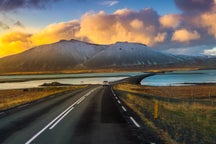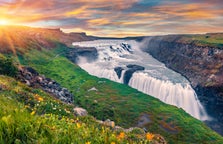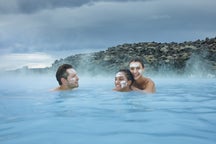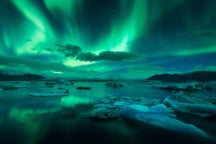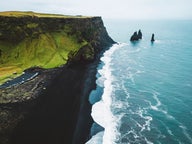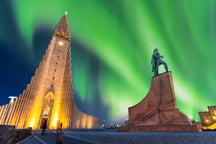
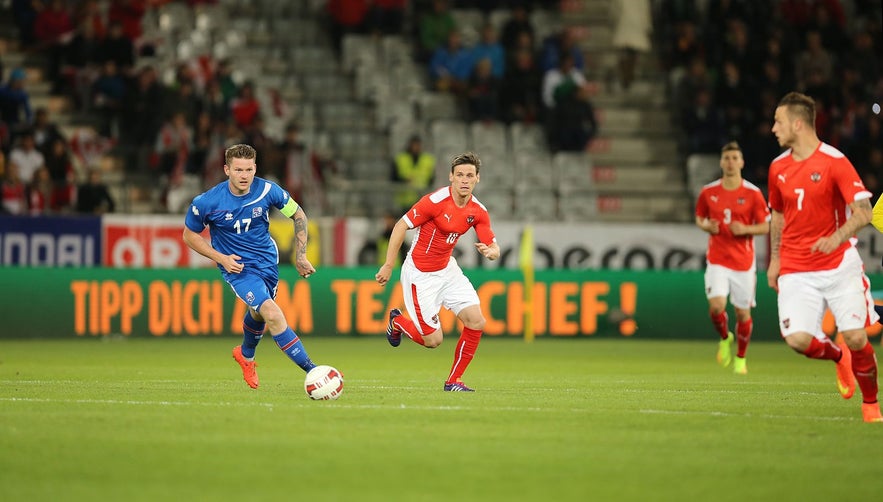
Football has found a new home in Iceland, with the Men’s and Women’s national teams reaching new and unexpected heights in both international and European competitions. But what is the secret to their success? How did an island with only three months of sunlight rise 91 places on the FIFA world ranking over just five years? Read on to find out all there is to know about football in Iceland.
Photo above from Wikimedia, Creative Commons, by Tobias Klenze. No edits made.
Why You Can Trust Our Content
Guide to Iceland is the most trusted travel platform in Iceland, helping millions of visitors each year. All our content is written and reviewed by local experts who are deeply familiar with Iceland. You can count on us for accurate, up-to-date, and trustworthy travel advice.
- Read more about Fitness in Iceland
- Check out this exciting Summer 8 Day Self Drive Tour
- Make a relaxing stop with this Blue Lagoon Transportation From Keflavik Airport
If you would like to learn more about the domestic clubs and leagues that can be found in Iceland, rather the national team, in particular, make sure to read our blog: The Top Football Clubs in Iceland.
The World Cup Dreams of A Nation
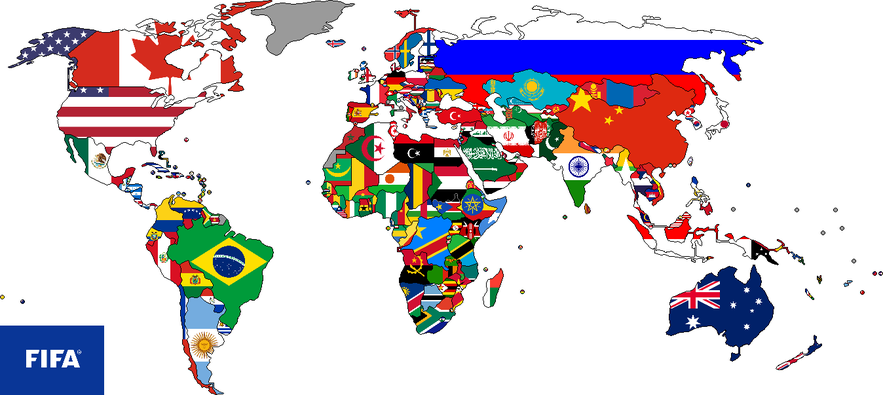
Iceland became the smallest nation to ever compete in the FIFA World Cup when in 2018, the team went to Russia. At home, the fans were giddy with excitement, ready to prove what their nation was capable of on the world stage, ready to shake the world of football up by its studded boots.
But in the super-strong group D, Iceland went on to draw against Argentina (1-1) in the first match, before losing to both Nigeria and Croatia and thereby finishing at the bottom of the group. The adventure was over before it properly began.
A Day To Change History
Picture the scene; June 27th, 2016. It is a half-clouded afternoon over the grassy embankment of Arnarhóll; all eyes are fixated on the enormous screen erected adjacent to Ingólfstorg Square. The scene is loud, rowdy and excitable, as any good football crowd should be. Thankfully, there's little reason for concern; hooligan culture is non-existent in Iceland; besides, this crowd is behind one national side and one national side only.
For anyone at the scene, avoiding the united exhilaration was simply impossible. Hundreds, if not thousands, of animated Icelandic fans, roared together, their cries of “Afram Island!” (“Onwards Iceland!”) as loud and primal as the unified Viking Clap ringing through the air. And yet, despite their collective passion and amalgamate joy, the scene felt eerily dreamlike and surreal; what we had all just witnessed couldn’t have been real, could it?
The final whistle blow marked a turning point in sporting history; 2-1 victory to Iceland over England.
- See a local reaction: Iceland beats England 2-1!!!!!! Iceland is through to the round of 8!!!!!
Three Lions on the Shirt England? Football’s Coming Home England? Multi-million pound, premier-league, sponsorship-sodden, post-Brexit England? No, this wasn’t a loss of our faculties. This happened. The deafening hustle of ecstatic Icelanders could not be denied. They had won.
The question then, of course, was how did this young, handsome and tattooed squad of Viking athletes conquer and humiliate the three lions with such grace? If looking for clues, some commentators could have looked back to the 2014 FIFA World Cup playoffs.
Despite being knocked out of the running by Croatia—a punishing red card left Iceland a man down—the Icelandic side had shown themselves to be fierce competitors, more than a match for the Croatians who, at that time, were celebrating a winning season.
But that couldn’t be the full story, could it? There have been flash-in-the-pan miracle stories in football before, after all; Estonia’s winning streak in the 2006 World Cup, for instance, or Denmark’s shock victory in Euro 2012. But the tactics on display here—the smash-and-grab, guerrilla manner of taking the ball, the defensive blockades, the opportunistic teamwork—it all pointed to a team invested in mastering the game and bettering their side.
It was in stark contrast to the English, whose lackadaisical approach to the match disrobed them, for that evening at least, as the inferior competitors.
The Icelanders were on their way to the quarter finals of the Euro 2016, preparing to face the French national side on their home turf. And who now knew what to expect? No longer were the international commentators so mocking and dismissive of this tiny team from a tiny populace. Now they were the true underdog story of the European Championships; a team that Europe, and the world, could get behind.
Since that day, professional Icelandic footballers have been considered national heroes here. Their victories sparked a flurry of passion, interest, emulation and ambition in Iceland, creating a footballing renaissance that has far outstripped the country’s national sport of handball.
And although the Icelanders would go on to lose 5-2 against France, they had achieved a victory quite unlike anything before seen in this country’s sporting history, a history that has not always been so kind...
- See Also: Iceland's Football Team is back home
Early History of Football in Iceland
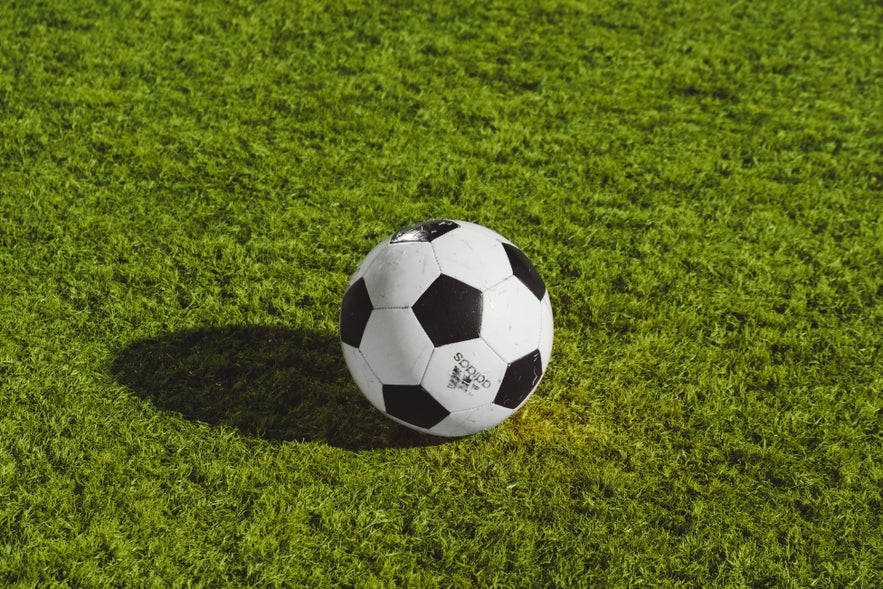 Photo by Wesley Tingey. No edits made.
Photo by Wesley Tingey. No edits made.
Iceland’s much-cherished landscape—a cacophony of sweeping volcanic hills, dried lava plateaus and ominous mountain ridges—has until recent history been inhospitable to those who fancied football as a pastime. Pitches were, at best, either sand, gravel or flatbeds of dried magma. Naturally, there was no opportunity to play or train during the snow-laden winter months, leaving roughly three months of the year in which the weather was permissible.
The Icelandic national team did not play on grass until as late as 1957, though the island’s first football club, Knattspyrnufélag Reykjavíkur (Reykjavík Football Club), has existed since 1899. Given the harsh and unmanageable conditions, it is little wonder the Icelanders have always considered themselves disadvantaged when it comes to outside arena sports.
The Icelandic football league, Úrvalsdeild karla, was conceived of in 1912. With the league's founding, a number of clubs quickly began to form.
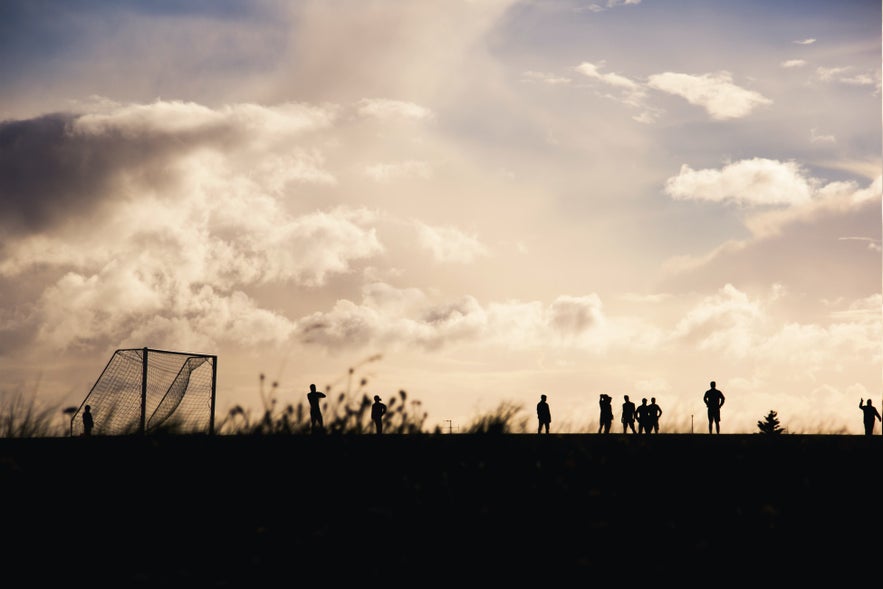 Photo by Mari Carmen Del Valle Cámara. No edits made.
Photo by Mari Carmen Del Valle Cámara. No edits made.
Iceland's first international match was against the Faroe Islands on 29th July 1930, culminating in a 1-0 victory over the home side. The country's first FIFA affiliated match was at home on the 27th July 1946 against Denmark. The Icelandic side would go on to lose the match 3-0.
Undeterred, they achieved their first international victory a year later against Finland. Throughout this period, Iceland did not participate in any World Cup or European qualifying matches. This all changed from 1974, with Iceland participating in the qualifying playoffs of every tournament since.
Iceland’s most humiliating defeat came at the hands of their old colonial overseers, Denmark, in a 1967 friendly match that ended with a staggering 14-2 defeat. Iceland even has a beer named after this defeat, Nørrebro / Borg 14-2, best enjoyed chilled whilst watching the below video.
With perseverance and the leadership of coach Lars Edvin "Lasse" Lagerbäck, the team finally hit upon a major breakthrough in 2015. Two victories over The Netherlands meant that they would be the first Icelandic squad to break their way into a major European tournament; the Euros 2016. Throughout the qualification process, the team managed to reach 23rd on the FIFA World Ranking, they're then highest ever grade. In July 2017, Iceland would be ranked number 19.
- See Also: History and Culture of Iceland
UEFA European Championships 2016
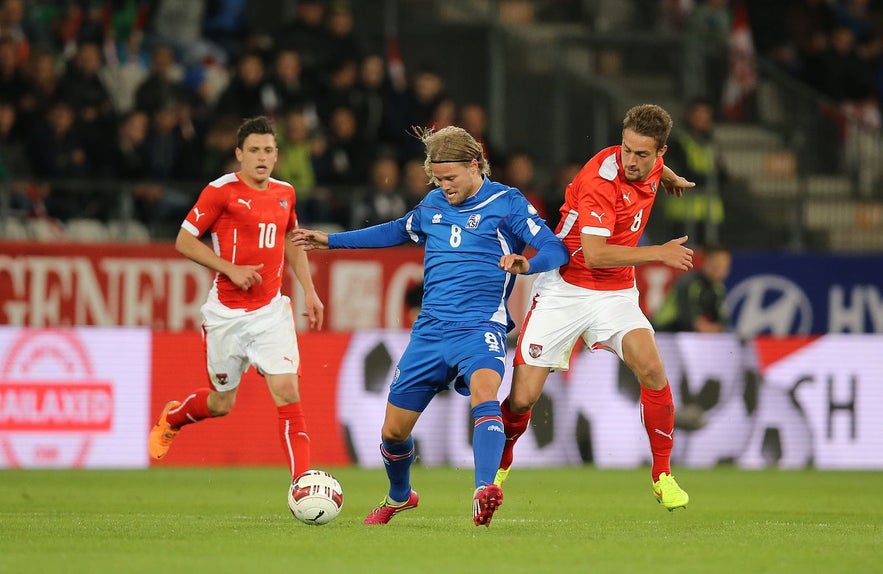 Photo from Wikimedia, Creative Commons, by Tobias Klenze. No edits made.
Photo from Wikimedia, Creative Commons, by Tobias Klenze. No edits made.
On the 13th October 2015, Iceland finished 2nd in the qualifying stage of the 2016 European Championships. Out of ten games, the newcomers had won 6 matches, drew 2 and lost 2. The country’s first-ever tournament match was to be against Portugal, a prize contender and the expected champion by far.
The match began poorly for Iceland, with Portugal’s Nani landing the first goal at thirty minutes. After twenty minutes of fierce play, Iceland equalised with a goal from centre midfielder Birkir Bjarnason. Against all odds, the match ended with a draw, sparking much excitement in the football community.
Having drawn 1-1 with Iceland in the first round fixture, the superstar team Portugal had taken a thorough knockback, whilst the Icelanders had surprised the world with their courage, ability and team spirit.
Naturally, there was vocal dissent on the side of the defeated Portuguese, in particular, Cristiano Ronaldo, who was one of the first to express his lack of enthusiasm for this burgeoning fairy tale.
Ronaldo would later comment, ‘I thought they had won the Euros the way they were jumping around at the end. It was unbelievable. When they don’t try to play and just defend, defend, defend, this, in my opinion, shows a small mentality and they are not going to do anything in this competition.’
This coming from a man who was denied private changing facilities at the modest Laugardalsvöllur stadium.
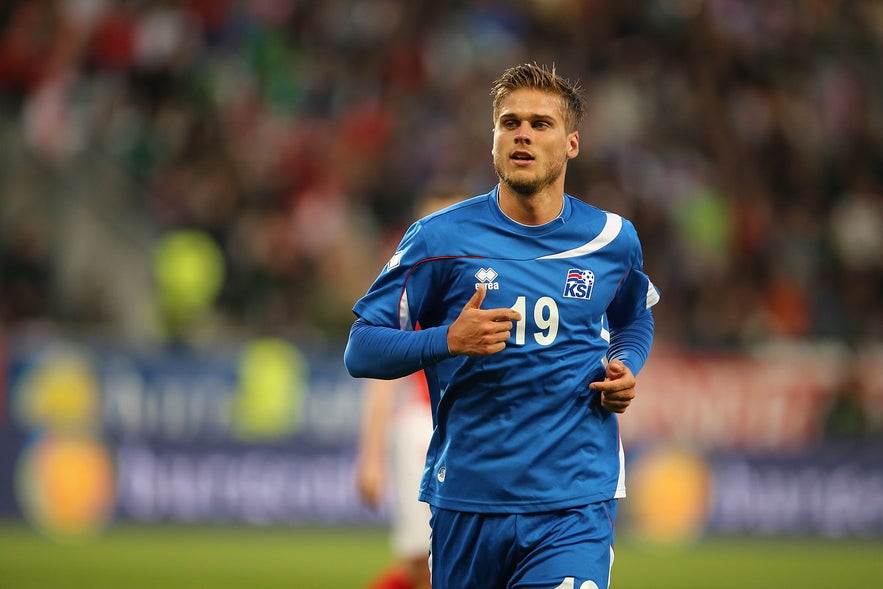 Photo from Wikimedia, Creative Commons, by Tobias Klenze. No edits made.
Photo from Wikimedia, Creative Commons, by Tobias Klenze. No edits made.
Iceland’s coach was quick to respond to the comments, nonchalantly stating ‘he can do what he wants, we’re just happy with the point’. Defender, Kári Árnason responded that Ronaldo was ‘a sore loser,’ adding, ‘He didn’t want to lose the game. What does he expect – for us to play like Barcelona against him? He fannies about and dives around. We didn’t pay any extra attention to him.’
The Icelandic side had two major breakthroughs in the 2016 European Championships. There was a momentary lapse in their next match against Hungary, with Birkir Sævarsson giving away points with an own goal. Still, the final whistle concluded with a 1-1 draw and highlighted the newcomers as a force to be reckoned with.
It was in their final game of the qualifying round with Austria, however, that would push Iceland to meet supposed champion teams of football. Arnór Ingvi Traustason’s breakaway goal in extra time won the game 2-1 to Iceland. For the first time in tournament history, Iceland would meet England on the field.
Iceland V England: UEFA Euro 2016
Before the team’s match with England, The Guardian newspaper pointed out the Icelandic side’s strengths throughout the tournament; strengths that Roy Hodgson would have to watch out for carefully if he hoped to avoid a humiliating defeat. In retrospect, it looks as though Hodgson might have missed that particular article.
Amongst these strengths was the calm, composed and unorthodox collaboration between coaches Heimir Hallgrímsson and Lars Lagerback, the pair of them making a stark contrast to Hodgson, the then highest paid football manager in history (£4.6 million per year). After all, Lagerback had previously coached the Swedish and Nigerian national teams, while Hallgrímsson still worked as a dentist in his hometown.
And yet, most important of all, it was noted that the Icelandic team had a unique bond with their fans. Given the gravity of the team’s achievements and the small population of their home country, the players could claim confidently that they knew ‘at least 50% of the Icelandic crowd’.
This was hardly surprising given that one-eighth of Iceland’s total population had travelled to France in support whilst 99.8% of all Icelandic televisions were tuned in to watch the game at home. This undying support on behalf of the Icelandic fans is why they have been given the collective title “Tólfan” (“The Twelve”), as in they are the twelfth player on the pitch.
The game itself was soon underway, with England showing an urgent superiority over the Icelanders within the first few minutes. In the fourth minute, England midfielder Raheem Sterling was brought down by Icelandic goalkeeper (and film director) Hannes Þór Halldórsson, earning England an early penalty. Minutes later, Wayne Rooney scored the first goal of the match, driving the ball into the bottom left-hand corner of the net, just out of reach of Hannes' dive.
Yet, less than a minute later, an equaliser! Team captain, Aron Gunnarsson—already famous for lobbing the ball into the penalty area—led to Ragnar Sigurðsson's shot from the edge of the six-yard box. The gravity of that goal took the world by surprise, least of all the England squad.
An early knockback had resulted in a slap in the face for the three lions, and now the pressure was on to ensure their already-promised victory went without a further hitch. What should have been a sure three points was now turning into the must-see match of the tournament.
The next fifteen minutes saw England regain their composure, maintaining ball control and firing off a few misplaced shots. It was met by another slap in the face; Kolbeinn Sigþórsson's low shot was met and obstructed by England goalkeeper, Joe Hart, but it wasn't enough to stop the ball sliding from his grasp, rolling at a leisurely pace into the back right-hand side of the net.
Iceland was 2-1 up in the first half; as an Irish sports journalist, Barry Glendenning, wrote at the time, 'England has been beaten by a supermarket!'
At half time, England was facing a crippling humiliation. Already, the tide had turned against Joe Hart who, despite appearances, had been labelled one of the world's greatest goalies. There was, however, still forty-five minutes to get their act together; victory could be clutched from the jaws of defeat.
At the second-half whistle, it was clear however that the English side was feeling burdened. Their desperate long shots across the pitch meant Sterling was forever chasing the ball; Hannes was there to meet him each time, further frustrating the losing side.
In the 56th minute, Ragnar again was presented with a chance, swinging his legs in a spectacular bicycle kick that, unfortunately, was met directly by the English goalkeeper. It was, however, a clear indication that the English were outstripped that evening, their athleticism predictable and disjointed.
Regardless of the ensuing substitutions, England could do nothing to claw back. The Icelanders were playing remarkably well and to their strengths, while the English embarrassed themselves enough that Hannes Halldórsson had little to do in the second half.
After three minutes of extra time, the final whistle was blown. 2-1 to Iceland and the victors stormed the pitch, yelling and whooping in jubilation alongside their hysterical fans.
England could not hide the gravity of its loss, with Roy Hodgson resigning immediately following the game. But this was not England's night—or week, given the Brexit result—but only Iceland's, whose sheer pride could not be restrained.
Still, there was no one quite so excited as this particular Icelandic commentator;
"This is done! This is done! We are never going home! Did you see that? Amazing! I can't believe it! This is a dream. Never wake me from this amazing dream! Live the way you want, England! Iceland is going to play France on Sunday. France Iceland! You can go home. You can go out of Europe. You can go wherever the hell you want. England 1 Iceland 2 is the closing score here in Nice. And the fairytale continues!"
The commentator, Guðmundur Benediktsson, had previously shown his excitement with Iceland's win against Austria, as shown in the video below.
The Icelandic Women’s National Football Team
Ranked 19th in the FIFA world ranking in June 2017, the Icelandic women’s national football team has, once again, shone a light on the passions of Icelanders everywhere; Euro 2017 is upon them, and just as with ‘our boys’, the nation is resolutely behind them.
It is the third time the women’s side have reached the finals. The current squad is coached by Icelandic football player and manager, Freyr Alexandersson, whilst Margrét Lára Viðarsdóttir serves as team captain.
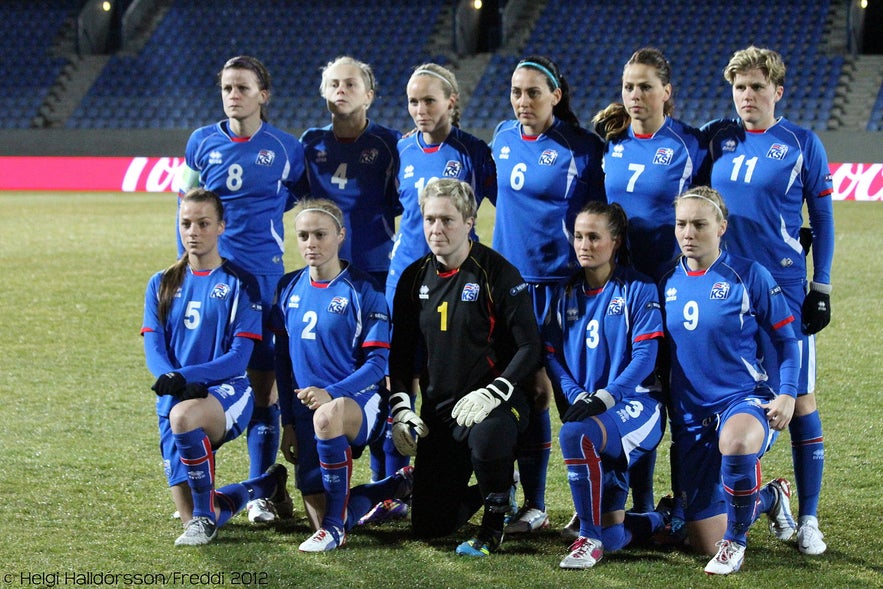 Photo from Wikimedia, Creative Commons, by Helgi Halldórsson. No edits made.
Photo from Wikimedia, Creative Commons, by Helgi Halldórsson. No edits made.
Due in large part to Iceland's grassroots football scheme, there are a great number of young girls who are now inspired to compete professionally. Unlike elsewhere, the small population and community spirit of Iceland means that the general populace is just as interested in supporting and following women's football.
This is especially the case when our girls represented Iceland overseas, as they will in Euro 2017.
Many Icelanders travelled to the Netherlands to support their team, including celebrities and the Icelandic president. To show their loyalty, a large number of football fans even culminated at Keflavík Airport to wave their team goodbye and wish them luck.
Iceland's first match of Euro 2017 was against France. The team lost 1-0 to the French side—ranked 3rd on the FIFA world ranking—the referee having awarded their opponents a penalty kick in the 86th minute. Eugénie Le Sommer scored for France, leaving a disappointing result for the Icelandic side. Throughout the match, the French pressure was ever keeping the Icelanders in their own half, making a second goal more and more unlikely. It should be noted that France is the expected favourite to win the championships.
The team's second match in the UEFA Euro 2017 was against Switzerland, with Fanndís Friðriksdóttir taking the early lead for Iceland with a goal in the thirtieth minute. Lara Dickenmann scored the equaliser twelve minutes later. The match's second half saw a focused play on both sides, though Switzerland's control of the ball and opportunistic shooting sealed them a second goal in the 52nd minute. Despite eleven minutes of extra time, Iceland could not secure a victory, meaning their time in this year's competition is now past.
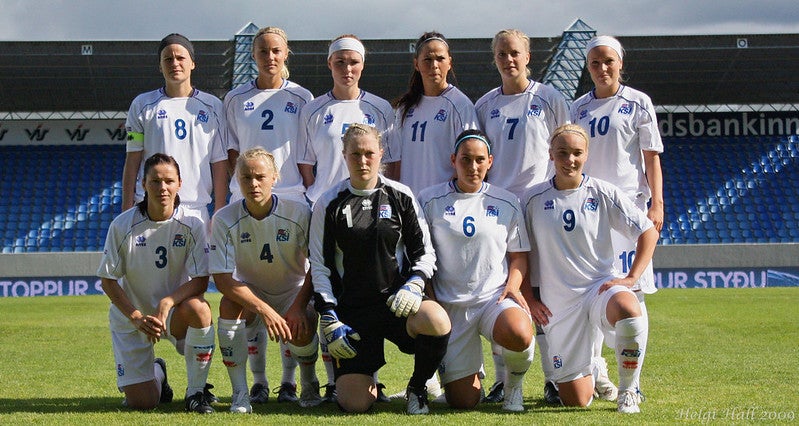 Photo by Helgi Halldórsson
Photo by Helgi Halldórsson
The women's side has had a number of achievements in the past; the team reached the group stages of the UEFA Women's Euro 2009 in Finland and the quarterfinals of UEFA Women's Euro 2013 in Sweden. Their biggest victory ever occurred in 2009, after beating the Estonian team 12-0 in Reykjavík. Their biggest losses occurred against Germany in 1996 (8-0) and the United States in 2000 (8-0).
As with the Men's Team, Icelandic airline Icelandair has done their part to support the women's team, starring them in the below advert. The advert does much to show the difficulty often associated with women and young girls trying to get into male-dominated sports.
- See Also: Gender Equality in Iceland
The team also stars as the focus for the documentary 'Stelpurnar okkar' ('Our Girls'), directed by Þóra Tómasdóttir and Hrafnhildur Gunnarsdóttir, a film detailing the team's journey through the UEFA Women's Euro 2009.
KSÍ | Football Association of Iceland
The Football Association of Iceland (Knattspyrnusamband Íslands, KSÍ) is the overall governing body of football in Iceland. Despite the seemingly unpronounceable name, 'Knattspyrna' means "ball-kicking" in Icelandic.
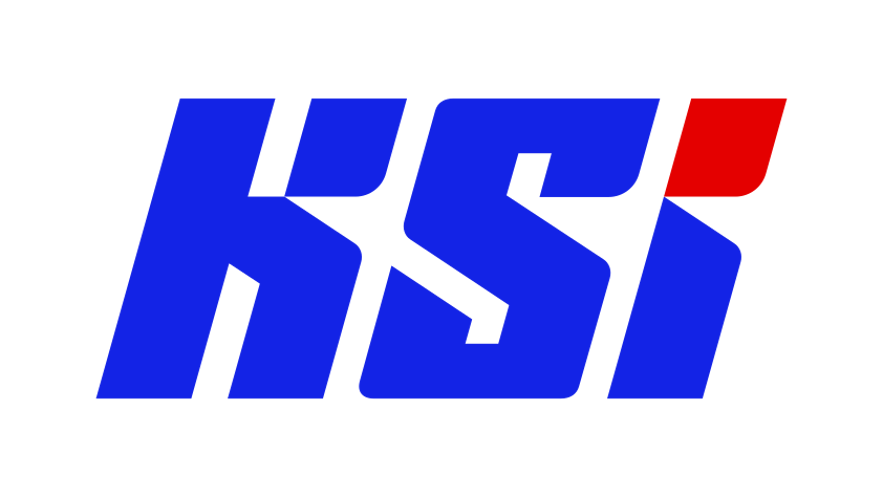
Founded 26th March 1947, KSÍ is in charge of: both the Men’s and Women’s National teams, the Icelandic football league (Úrvalsdeild karla), coaching and referee education, licensing and nurturing a domestic interest in the sport. KSÍ joined FIFA in 1947 and UEFA in 1954.
Guðni Bergsson is the current President of Football Association of Iceland, having been elected 11th February 2017. Guðni began his own football career with the Icelandic club, Valur F.C, before fostering ambitions to play overseas. After an initial trial with the English club, Aston Villa, Guðni later took a position with Tottenham Hotspur, where he stayed as a defender from 1988 to 1995. During his tenure at the club, Guðni also became Captain of the Icelandic national team.
From 1995 to 2003, Guðni played for the both the Bolton Wanderers and the national team. After his retirement, Guðni would go on to host a popular hit-television show around football, ‘Boltinn með Guðna Bergs (Ball with Guðni)’, and worked as a certified lawyer in Reykjavík.
Grassroots Football in Iceland
Many have argued that Iceland is far outstripping the rest of the world when it comes to grassroots football. This has not always been the case, but the propulsion in talent, energy and interest can be traced to the beginning of the millennium when the country invested in building large, indoor arenas called “Soccer Houses”.
Traditionally, football had always been a summer sport in Iceland given the strong winds, rough terrain and inhospitable temperature. Sports enthusiasts would spend the winter playing the country’s national sport of handball or even basketball. And yet, with the introduction of artificial pitches, the opportunity for aspiring footballers to train the year round was suddenly a reality.
With an emphasis on training, sessions are open to kids as young as four. By seven-year-olds, the young ones have the chance to be training three times a week. By 2016, Iceland had 600 elite coaches trained, one per 550 people. To put that in perspective, England has one elite coach for every 11,000 citizens.
Icelandic football league (Úrvalsdeild karla)
The Úrvalsdeild karla is the highest football league in Iceland, ranked 35th worldwide by UEFA. Since 1912, the league consisted of ten different clubs - that is until 2008 when the league was extended to 12, a bid on the part of the Icelandic Football Association to strengthen interest in the sport domestically. The league is sometimes referred to as "The Pepsi League" thanks to the sponsorship of Icelandic subsidiary, Ölgerðin.
All clubs in the league play two games, one at home and one away. Due to the country's cruel winters, the season occurs between May and September, with the two lowest clubs relegated to Division 1. The two top clubs from Division 1 are promoted to the Úrvalsdeild karla.
The current champions are FH, from Hafnarfjörður, a powerhouse of a football team since the early millennium. It is the eighth time the team has been crowned champion of the league. However, the Reykjavík side Knattspyrnufélag Reykjavíkur holds more overall wins, having been victorious 26 times over the leagues century old history. Valur F.C. is a close second, with 20 wins.
League clubs play in both the Icelandic Cup competition and the Icelandic League Cup. Winners of the former competition (founded 1960) qualify to play in the UEFA Europa League, with finals taking place at Laugardalsvöllur in mid-August. The Icelandic League Cup, also known as 'The Deildabikar', is considered the third most important competition in the country. Knattspyrnufélag Reykjavíkur is the current champion of Icelandic League Cup.
Key Players in Icelandic Football
Albert Guðmundsson
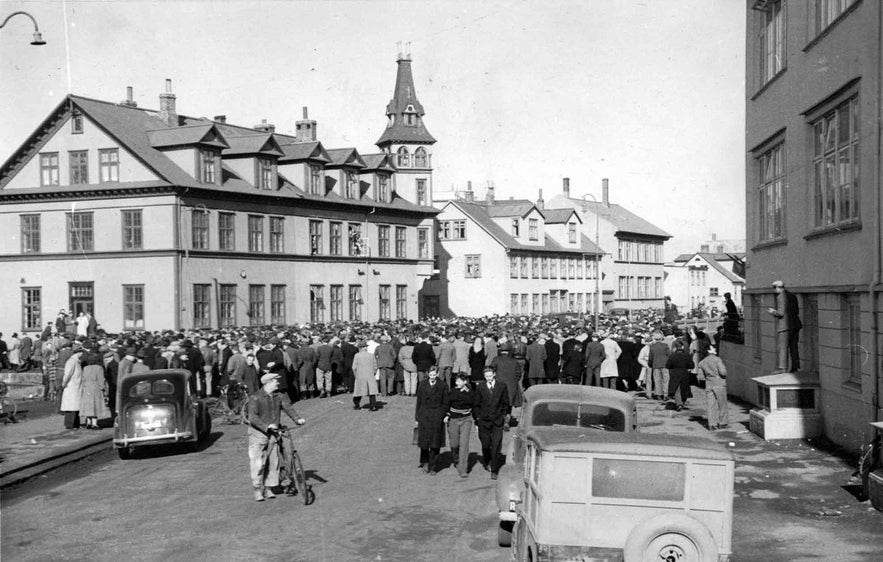 Photo from Wikimedia, Creative Commons, by Valgerður Tryggvadóttir. No edits made.
Photo from Wikimedia, Creative Commons, by Valgerður Tryggvadóttir. No edits made.
Albert Guðmundsson (1922 - 1994) was Iceland’s first professional footballer. As a young man, Albert played for Valur before leaving for Scotland to study business at Skerry’s College in Glasgow. During his stay in the city, Albert would continue to nurture his ambitions as a footballer, playing for the Scottish club, Rangers F.C. He would later go on to play as an amateur for the London club, Arsenal F.C.
Having caught the eye of French athletic scouts, Albert would go on to play with Football club de Nancy, a now dissolved team (1968), finishing the season as top goal scorer, as well as having scored at least two goals in every cup game. Following his time at FC Nancy, he was signed to AC Milan. Unfortunately, a knee injury ultimately severed his contract with the club and, after recovery, Albert would return to France, playing for clubs such as RC Paris and Nice F.C.
After retiring from professional football, Albert joined the Independence Party in 1970, becoming a councilman for Reykjavík in the same year. In 1974, he was elected as a member of the Alþingi; ten years later, he enjoyed time as Minister of Finance and Minister of Industry. After his resignation, Albert made a presidential bid, but lost to Vigdís Finnbogadóttir, the world’s first democratically elected female President.
Sara Björk Gunnarsdóttir
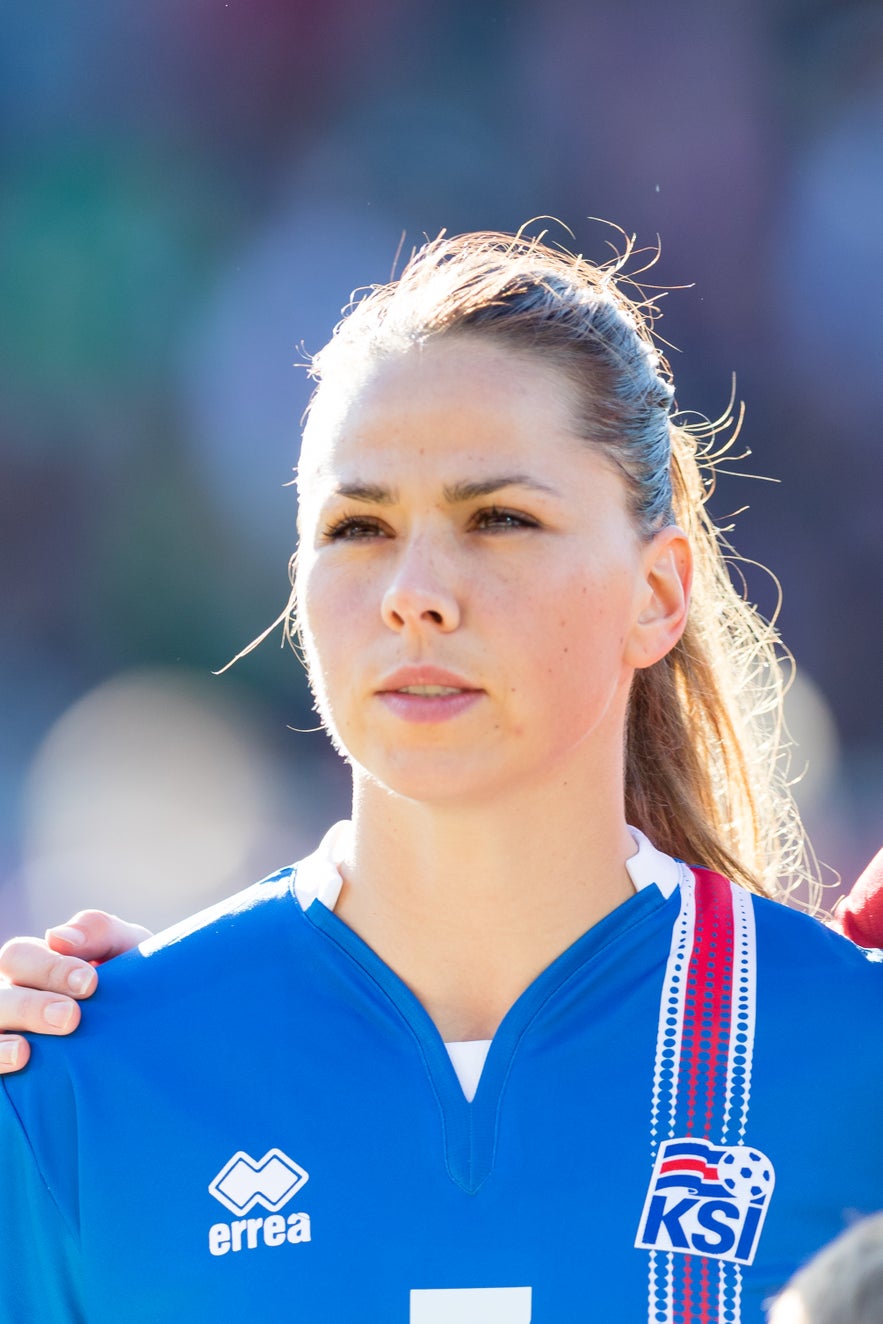 Photo from Wikimedia, Creative Commons, by Sven Mandel. No edits made.
Photo from Wikimedia, Creative Commons, by Sven Mandel. No edits made.
Sara Björk Gunnarsdóttir (born 29 September 1990) is a professional Icelandic footballer who currently plays for the German club, VfL Wolfsburg.
It seems Sara Björk was always destined for professional football, having joined her local team, Haukar, at six years old, staying for a further twelve. She would later join Breiðablik for three seasons before transferring over to the Swedish club, LdB FC Malmö. She was an immediate success in Sweden, scoring 12 goals towards Damallsvenskan title.
She has represented the Icelandic national team since 2007 (aged 16) and has played in the UEFA Women's European Championships in 2009, 2013 and 2017. Sara Björk also served as Team Captain for Iceland during Margrét Lára Viðarsdóttir's maternity leave.
Eiður Smári Gudjohnsen
Eiður Smári Guðjohnsen (born 15 September 1978) is a prolific Icelandic professional footballer, playing primarily as a forward. He is the son of former Iceland player, Arnór Guðjohnsen; his international debut, in fact, came after he was brought on as a substitute for his father in 1996.
Amongst his many achievements are a stint at the English premier league club, Chelsea F.C. and a stay at a Barcelona F.C. He also had two spells at Bolton Wanderers, though there was a fourteen-year gap between these placements. On top of that, Eiður has played for Monaco, AEK Athens and for the Chinese super league team, Shijiazhuang Ever Bright.
He has also served as captain of the Icelandic team until the side was taken over by coach and former Iceland player, Ólafur Jóhannesson. Eiður has scored over 150 goals throughout his professional career. His most recent international game was against France in Euro 2016.
Gylfi Sigurðsson
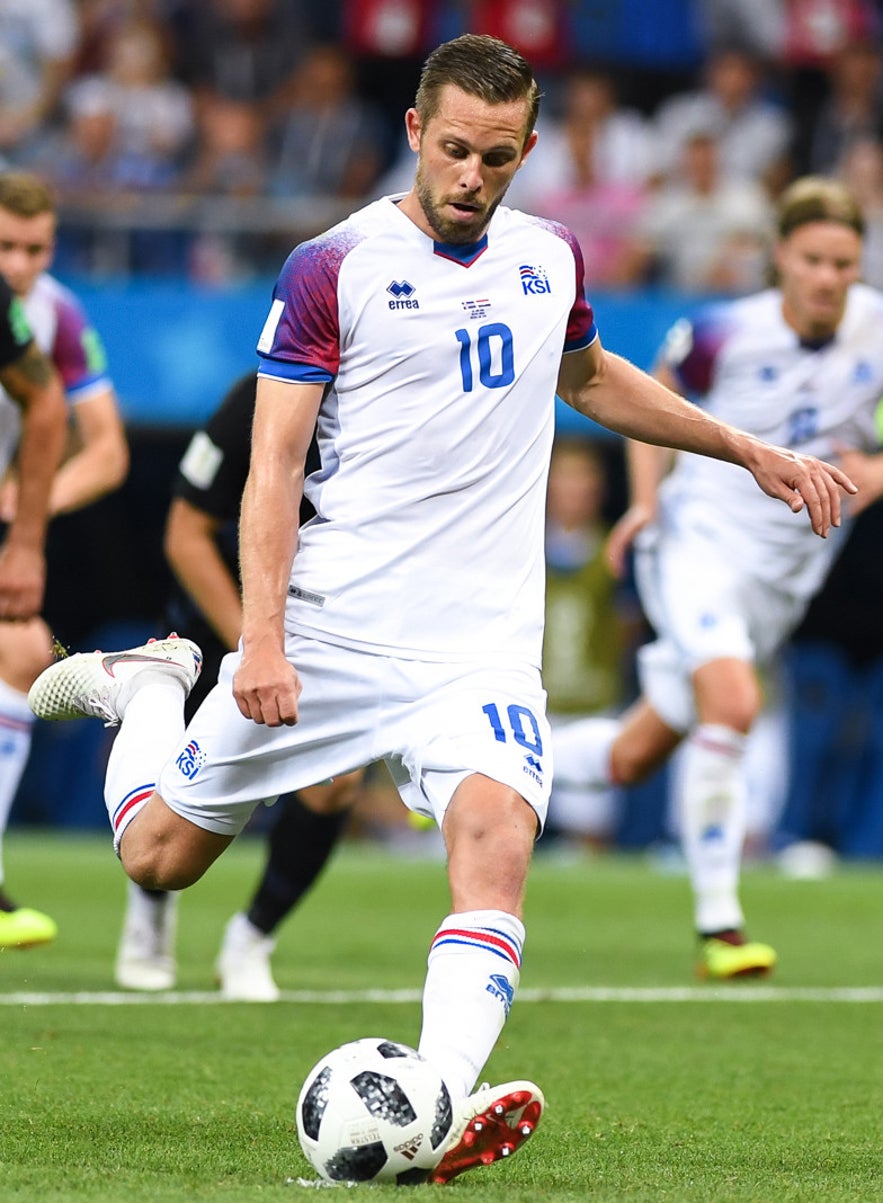 Photo from Wikimedia, Creative Commons, by Светлана Бекетова. No edits made.
Photo from Wikimedia, Creative Commons, by Светлана Бекетова. No edits made.
Gylfi Þór Sigurðsson (born 8 September 1989). Gylfi is the highest paid Icelandic footballer in history, earning 40 million ISK per month. He made his debut for the Icelandic national team in 2010.
Gylfi currently plays as a midfielder for the Welsh club, Swansea City. He began his professional career within Icelandic professional football, playing for Fimleikafélag Hafnarfjarðar in 2002, then later for the Kópavogur side, Breiðablik. He made his overseas debut at Reading F.C. playing for their youth club under an Academic scholarship. Gylfi was one of five students who were picked up for a professional contract following the scholarship.
Whilst at Reading F.C. Gylfi became the clubs largest ever sale, moving to German Association football club, TSG 1899 Hoffenheim. During this period, he was voted as Player of the Season twice, once at Reading, the other with Hoffenheim. He would later be loaned to Swansea, and later, to Tottenham Hotspur.
Margrét Lára Viðarsdóttir
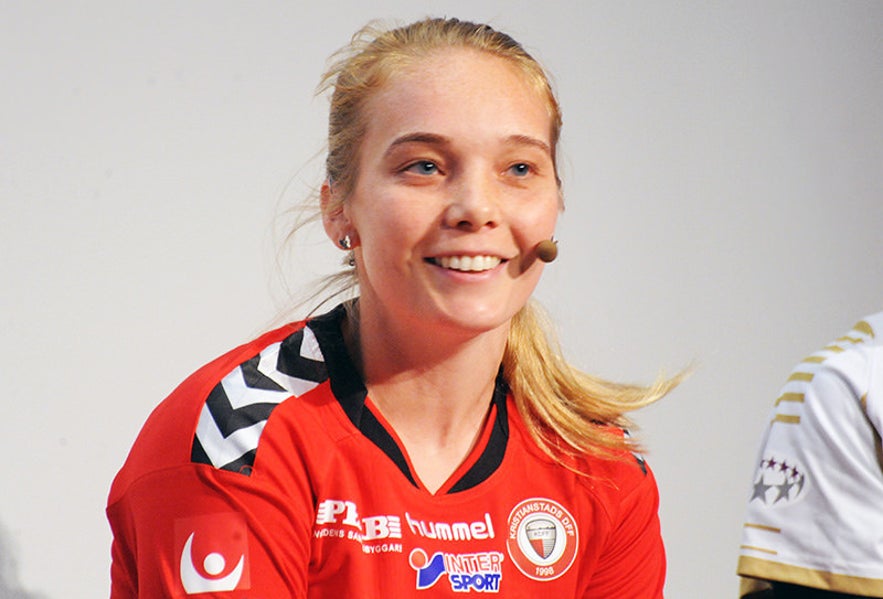
Margrét Lára Viðarsdóttir (born 25 July 1986) is an Icelandic professional football player and current captain of the women's national team. As a striker, Margrét made her Úrvalsdeild debut at 15 years old, quickly transferring over to Valur where she became a prolific goal scorer.
Her talents were soon noted, and Margrét was pursued doggedly by international clubs, as well as making her 2001 debut with the youth Icelandic national side. The now defunct German club, FCR 2001 Duisburg, was the first to sign her, leading to a one year stint with the team from 2007. The next year, she returned to Iceland to play for Valur F.C. In 2003, she first began to play for Iceland's woman's side.
Since then, she has played for the clubs: Linköpings FC, Kristianstads DFF, Turbine Potsdam. Her sister is Elísa Viðarsdóttir, who plays defence for the national side.
Iceland & 2018 FIFA World Cup
Over recent months, Icelandic footballers have, once again, set out to prove their Viking ancestry, smiting their opponents with tact, grace and a blazing ambition. For sports fans, this is history in the making, another major boost to Iceland’s reputation around the globe.
Iceland was placed in Group I of the qualifying rounds for the 2018 Fifa World Cup in Russia, alongside Kosovo, Turkey, Croatia, Ukraine and Finland. For the most part, the qualifying rounds were about as entertaining, and rewarding, as the sport can get. From the beginning, the Icelandic team made incredible strides towards cementing their homeland’s place in footballing history, having caused major upsets with a 3-0 victory over Turkey, a 2-0 win over Ukraine and a 1-0 final score against Croatia.
Out of 10 qualifying games, Iceland bagged a more-than-respectable sixteen goals, with only one underlying draw, seven victories and 2 losses. The sides’ final qualifying match against Kosovo was always going to be one of the major highlights of the tournament for Icelanders, an anticipation fuelled all the more given Kosovo’s performance throughout (8 losses and 1 draw, 0 victories).
The final game saw Iceland score 1 goal in the first half, and another one in the second, the final score being 2-0 in Iceland's favour.
And so, with Iceland’s place in the World Cup now firmly established, football fans across the world eagerly await the sides’ impact. After all, this is the team that beat England 2-1 at the Euros.
With that in mind, any concept of putting boundaries and barriers around their potential seem defunct. With an ever-emerging talent pool and a determination that outmatches even the established championship teams, Iceland’s shot at lifting the World Cup is as good as anyone else's. Who would have ever considered that?
Did you enjoy our article about Football in Iceland? Who will you be supporting as your team through the 2018 World Cup? Make sure to leave your thoughts and queries in the Facebook comments below.








